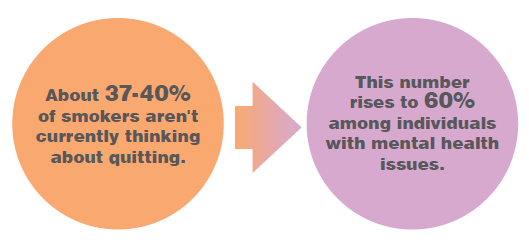
3.4 Why is quitting smoking harder for people with schizophrenia?
Quitting smoking is never easy, but for someone with schizophrenia, it can feel like climbing a mountain.

3.4 Why is quitting smoking harder for people with schizophrenia?
Quitting smoking is never easy, but for someone with schizophrenia, it can feel like climbing a mountain.
Tobacco addiction is a tough opponent, and schizophrenia adds another layer of difficulty. The withdrawal symptoms from tobacco, such as irritability, depression, and anxiety, can be especially intense for those already struggling with mental health challenges.
But here’s the good news: while it’s more difficult, it’s not impossible. With the right support and resources, people with schizophrenia can and do quit smoking.
What obstacles do people with schizophrenia face when trying to quit smoking?
Several obstacles make quitting smoking particularly challenging for people with schizophrenia:
ADDICTION AND CRAVINGS: While these factors play a significant role, there’s also strong evidence that smoking is used as a way to cope with some of the symptoms. These might include stress, feeling down, boredom, and even social isolation. Smoking can become a way to manage these challenging feelings and situations.
LIMITED RESOURCES: Both patients and healthcare providers often struggle with a shortage of necessary resources. Although some specific programs exist, many patients cannot afford the cost.
NEGLECT AND OUTDATED ATTITUDES: Some responsible persons still hold onto outdated prejudices, overlooking the importance of assisting patients in quitting smoking.
STIGMA: Patients with schizophrenia often face stigma, which can hinder their access to smoking cessation support.
Addressing these barriers is essential to helping people with schizophrenia in their efforts to quit smoking.
Tobacco Use Disorder is more than just a personal choice.
Conditions like tobacco use disorder aren’t something people choose – they often arise from a mix of genetic factors and life experiences that make someone more vulnerable.
Addiction is a type of mental health condition.

Gender and nicotine: how men and women respond differently
Extensive research has shown that there are gender-related differences in how people respond to smoking.
WOMEN tend to METABOLIZE NICOTINE AND ITS BYPRODUCT COTININE FASTER than men, partly because of estrogen levels. This faster metabolism might explain why women often experience more NEGATIVE EFFECTS FROM NICOTINE and have POORER SUCCESS RATES WITH TREATMENTS.
Studies indicate that WOMEN are MORE REACTIVE TO NICOTINE RELATED CUES AND STRESS, making them more prone to relapse, especially after stressful events. Additionally, women generally respond LESS FAVORABLY TO NICOTINE REPLACEMENT THERAPIES compared to men.
One reason for the similar smoking rates among adult men and women could be tobacco marketing STRATEGIES AIMED AT WOMEN, emphasizing appetite suppression, weight loss, and independence.